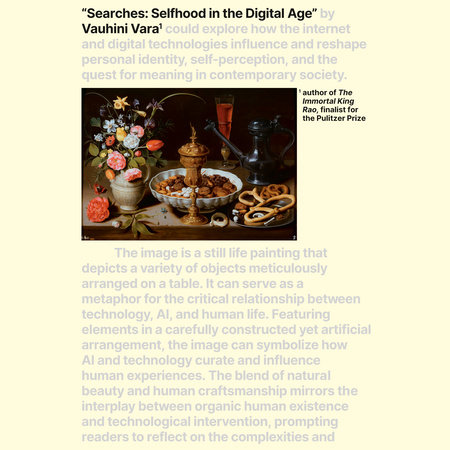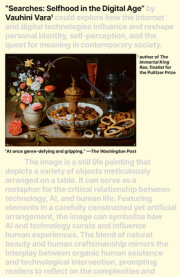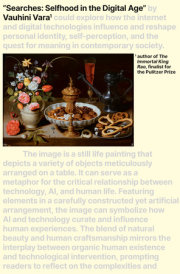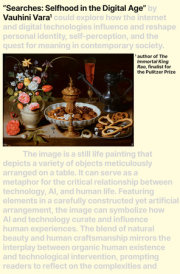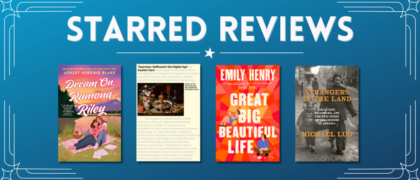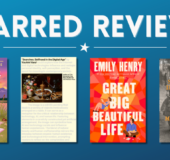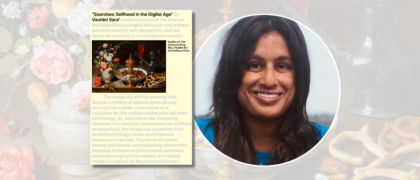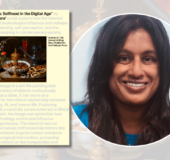Chapter 1
Your Whole Life Will Be Searchable
I first encountered the internet at the home of a girl from school whose parents were acquaintances of my parents. This was in the early 1990s, in a well-off suburb of Oklahoma City called Edmond. I remember the girl’s name well, but it feels unfair to share it; I’ll call her Lily Zhang. Lily steered me to a room away from our parents with a beige desktop computer. She typed some characters and tapped the mouse, and the computer burst into a long, staticky screech, punctuated by a series of sharp beeps, as if the machine were hyperventilating.
It was an anxiety-provoking sound, at an anxiety-provoking time in my life. I was eleven, twelve. We had recently moved to Edmond from Saskatchewan, Canada, the prairie province where I’d been born and raised. My dad, a doctor, had enrolled in a program at a nearby university to specialize as an occupational physician—part of a plan to relocate our family to the United States, where we could secure more promising futures than the ones available in Saskatchewan. I’d been through elementary school with the same classmates, kind Canadian boys and girls who treated my high self-regard, considering the circumstances (bad skin, social obliviousness, tender sensitivity to schoolyard injuries, overenthusiasm about math exams), with gentle forbearance. Because of this, I hadn’t understood, upon arriving in Edmond, that I was fated to be a social outcast there, and so, it was only when I walked up to the prettiest girls in the sixth grade and sat with them, admiring the gloss on their full, smooth lips, expecting to be invited to be friends, and they only subtly shifted their bodies so that I was no longer in their line of sight, as did many others over the following weeks, that I, for the first time in my life, became aware of my own shortcomings in the eyes of other human beings. My body itself offended—not just my brown and eczematous skin, but also my quarter-inch-thick glasses and my tummy-first way of moving through the world—even before I opened my mouth.
By the time of the invitation to Lily’s house, I had a stronger sense of the social hierarchy of Central Middle School and, in turn, had grown more modest in my self-presentation, though my internal self-esteem hadn’t waned. Lily also occupied a lowly rank but outwardly displayed major confidence, for which I judged her. Her loud, slightly arrogant voice. The way she hogged the keyboard, conveying pride of ownership. All projection on my part, in retrospect. It was in this context that when the modem’s shrieking gave way to silence, and Lily introduced me to my first America Online chat room, in which strangers from all over the world could meet other strangers, each human being manifesting on-screen only as their chosen screen name, everyone’s messages jostling democratically against everyone else’s in the same index card–sized window, I found myself utterly enchanted. This was, I thought, the most exciting invention I had seen in my life.
This period had a name: the Eternal September. In the formative years of the internet, in the 1980s and early 1990s, old-school internet users who hung out on message boards would get irritated every September when freshmen showed up at universities, received their campus-based internet accounts for the first time, and flooded the message boards. “They would use them to, among other things, download naughty images,” Jay Furr, an early internet user, told me. In 1989, the British computer scientist Tim Berners-Lee, working at a European institution called CERN, had invented the World Wide Web, a global information system that involved using browsers to open hyperlinked documents. Then, in April 1993, CERN decided to make its World Wide Web source code freely available. Suddenly internet traffic swelled, with companies like America Online coming along to capitalize on it. “The thing that brought about the ‘Eternal September’ was the availability of commercial Internet access,” Furr told me. For a fee, these companies would connect you to the internet through your phone line. If someone else in your house tried to make a call while you were online, you’d get disconnected without warning.
America Online started a direct-mail campaign sending floppy disks and CDs to people’s homes, offering some free hours of internet use if people signed up. “POP this FREE software in your computer for 10 FREE hours online!” one promotional mailing read. When the trial ran out, America Online charged a fixed amount—at one point, $9.95 for five hours of monthly internet access, with an option for “heavy users” to buy more time, for $2.95 an hour. That campaign was maybe as important as the opening of the World Wide Web’s source code in getting people using the internet. It’s how Lily Zhang’s parents must have gotten online. Soon after my first exposure to AOL in Lily’s house, my parents also bought a subscription, as did millions of others across the United States and, eventually, the world.
If you were alive then, you might have first gone online around this time, too. When you signed in to AOL, a screen would pop up with buttons and links to various services, like email, weather information, and those chat rooms. You might remember the chat rooms. We might have been in the same ones. Chat rooms were one of the most popular aspects of AOL, which didn’t yet include a browser for visiting websites. As I recall, my favorite magazine,
Seventeen, had its own room, where this one girl reigned. I recall that she was, appropriately, seventeen. She was a redhead; I recall that, too, because of the particulars of the redness of her hair, which we were meant to understand naturally had the same red color as a cherry or a chili pepper. I don’t recall her name, but it was hot, something like Chloe. Chloe would hold court in the room, advising the rest of us, mostly about how to be hotter. Sometimes one of us would ask her to join us in a private chat room so that we could get more personal—share our specific hotness needs and have a more intimate conversation about them. Because she was sought after and not often available, the few times she accepted my invitations, appearing with me in a separate one-on-one square, I felt a tiny jolt of excitement. I pictured her as Jessica Rabbit.
Unfortunately, her advice usually felt wrong for me; she gave it on the false understanding that I possessed a baseline level of existing hotness on which she could build, when in fact my hotness was negative. In normal life, I tried not to draw attention to this, but on the internet I felt more honest. You don’t understand, I’d explain to Chloe, because you’re already hot. She’d respond that her lessons were less about physical appearance than about performance; you could make yourself attractive by speaking or walking in a certain way, she believed, baseline hotness notwithstanding. That was, I told her, exactly the sort of thing a hot girl would believe.
At some point, people in the
Seventeen chat room started expressing doubts about whether Chloe was being honest about herself. I remember being shocked at the implication—that our empress would deceive her people! It was the particular redness of her hair that brought me around to the possibility. At the very least, I thought, she had to have dyed it. Yet while Chloe’s credibility was questionable, she was pretty much all we had then.
In 1992, there had been ten websites in the world; by 1993, there were 130. In August 1993—four months after the opening of the World Wide Web source code—a publisher of technical manuals named Tim O’Reilly announced that he was launching “a free Internet-based information center” called the Global Network Navigator. The information center, refreshed quarterly, would include news updates; a magazine with articles, columns, and “reviews of the Internet’s most interesting resources”; and, notably, a “marketplace” in which companies could pay to appear. O’Reilly’s information center would later come to be known as the world’s first commercial website. In May 1994, an interviewer asked O’Reilly, “What makes you think that people are gonna actually want to go in and look at advertisements?” He answered that they were already doing so. When some people think of the internet, he explained, they reflexively assume that commercial information is undesirable. “But it’s all information and people want it,” he said. “Particularly if you’re interested in a particular subject, commercial information may be what you want more than the stuff that’s there for free.” In fact, he said, people visited the marketplace section of his information center more often than they visited the magazine section with in-depth articles. “Because they
want commercial information.”
The summer before I started the eighth grade, my family moved again, this time to a suburb of Seattle; my dad had gotten a job as an occupational physician at the Boeing Company. It was 1995. By then, browsers had replaced AOL-style portals as the favored way to navigate the internet. From there, search engines had emerged. We were listening to the Spice Girls, TLC, Alanis Morissette. Bill Clinton was president; under him, the White House had created a website for the first time. In February 1996, Clinton signed the Communications Decency Act, meant to regulate information-sharing on the internet by criminalizing the transmission of obscene, indecent, and offensive material online under certain circumstances. The prospect of regulation rankled some people. One of them, a Grateful Dead lyricist and internet activist named John Perry Barlow, wrote a manifesto proclaiming that government wasn’t welcome in this space: “We are creating a world that all may enter without privilege or prejudice accorded by race, economic power, military force, or station of birth. We are creating a world where anyone, anywhere may express his or her beliefs, no matter how singular, without fear of being coerced into silence or conformity.” That perspective caught on, with some of the earliest internet executives amplifying the cause alongside free-speech activists. By 1997, the Supreme Court had struck down the law’s provisions about dirty talk—it’s farthest-reaching legacy would arguably end up being Section 230, protecting online platforms from being held liable for what their users post—and Clinton had turned his focus to supporting the internet’s “explosive potential for prosperity,” declaring that the best path forward for the government was to “not to stand in the way, to do no harm.”
Chat rooms had prepared us for what the internet was becoming—a place where, anonymized and disembodied, we could seek answers to our truest questions. The earliest search engines, of which Yahoo was the most popular, were directories: a column or two of hyperlinks naming broad subjects (entertainment, science, and so on), within which more columns were nested. In a search box, you would type what you were looking for and be taken to a list of relevant pages. There was a lot, at the time, that I was looking for. For one thing, moving from Oklahoma to Washington had not solved my hotness-related problems. My earliest searches were for information about my troubled skin. My face, especially at my hairline and above my lip, was perpetually covered in a layer of dry grayish patches that I had a habit of picking and peeling until they came loose, exposing the raw layer underneath. For this, a boy in our apartment complex had nicknamed me Crusty. I couldn’t bear to ask anyone about my skin; even with the dermatologists my parents took me to, I had a habit of pretending I thought it looked fine. But Yahoo felt like a safe space, one in which judgment was impossible. I searched for “eczema”; I searched for “psoriasis.” Maybe I searched for “crusty skin.”
The next year—my freshman year of high school—my older sister, Deepa, was diagnosed with a type of cancer called Ewing sarcoma. She was in her junior year. A lump had been growing on her arm; our family doctor misdiagnosed it for a while before sending her for the scans that revealed the truth. Immediately, she was admitted to Seattle Children’s Hospital to start an aggressive course of chemotherapy that would keep her in and out of the hospital—for both the treatment and the invariable side effects and complications—for months. When she stayed overnight, which was common, one parent would sleep at the hospital with her, while the other would be at home with me. On my visits after school, we watched
Friends or played cards or, if she wasn’t feeling well, just sat around. Her friends came often, as did her teachers. She had a straight-A average that she didn’t want to let slip—she dreamed of being valedictorian—so she would study in bed at the hospital, with her teachers stopping by to administer her exams. At one point, she went into remission, and the Make-A-Wish Foundation paid for her and her friends to visit New York, with her friends’ moms as chaperones. They took photos of themselves posing around the city in tank tops and little skirts. She graduated as a valedictorian of our high school, as planned, and started her freshman year at Duke.
Then her cancer returned, and she flew home and started treatment again. Sometimes she worried aloud that she would die, in response to which I would go cold and unresponsive. My sister’s cancer, even more than my skin, was a subject about which disclosure of my own fears was impossible. My sister—my bold, buoyant sister—was my personal deity. She had always been unapologetically open about her feelings and convictions, while I had always been guarded. I was a superstitious kid, avoidant of sidewalk cracks and black cats, a kid who slept facedown to avoid exposing my neck to vampires. I harbored a vague terror that naming my fears out loud would make them come true. So instead, I went to Yahoo with them. I thought Yahoo could tell me, specifically, the chances that my sister would die. I used the baroque, quotation-mark-heavy syntax common at the time—“ewing sarcoma” and “death,” “ewing sarcoma” and “prognosis”—but came up blank. I never did get up the nerve to take the question to a human being who might be able to answer.
Copyright © 2025 by Vauhini Vara. All rights reserved. No part of this excerpt may be reproduced or reprinted without permission in writing from the publisher.

